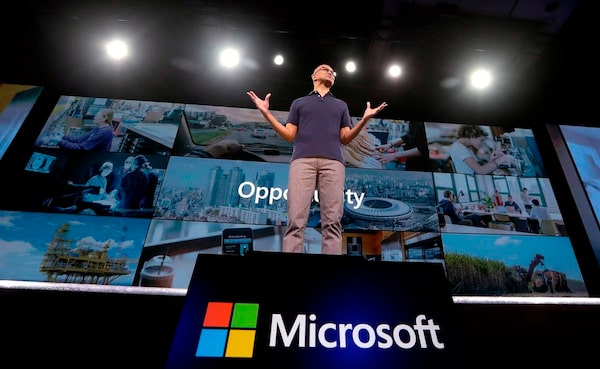
In Canada, a Carleton University analysis found that Ottawa spent about $300-million on Microsoft contracts in 2021-22, with nine-figure spending with the company in many previous years, too.Swayne B. Hall/The Associated Press
The extent to which Microsoft Corp. MSFT-Q uses a network of subsidiaries to allegedly shift profits to low-tax jurisdictions, potentially depriving countries where it conducts billions of dollars in business of corporate taxes, is analyzed in a new report.
The Centre for International Corporate Tax Accountability and Research (CICTAR) published a report late Wednesday that unpacks the ways Microsoft has worked for years to minimize its tax bills. The think tank’s analysis found tax structures involving Ireland and Bermuda, two widely acknowledged tax havens, “at the core of Microsoft’s global operations,” said its Australia-based principal analyst Jason Ward.
None of the report’s allegations suggests illegal or tax-evading behaviour, but they draw attention to an issue of growing concern to tax authorities worldwide.
Though the software and cloud-computing giant has reported profit margins of greater than 30 per cent in its recent years – including more than 40 per cent in fiscal 2021 – the think tank’s analysis found that Microsoft subsidiaries sometimes achieve margins of between 3 per cent and 5 per cent, significantly lowering what could be taxed.
Inside Amazon’s strategy to shield its profits from Canadian taxes
Microsoft is also one of the world’s biggest benefactors of public-sector software contracts paid for by tax dollars – at least US$3.38-billion worth in the past five years in the world’s biggest English-speaking countries alone, CICTAR found. In Canada, an analysis from Carleton University’s School of Public Policy and Administration found that Ottawa spent about $300-million on Microsoft contracts in 2021-2022, with nine-figure spending with the company in many previous years, too.
While Canada has less transparent information about multinationals’ tax practices than comparable countries, Mr. Ward said in an e-mail that “We have to assume that the profit shifting that occurs in other countries is also depriving Canada of revenue to fund essential public services.”
And CICTAR’s broad findings, he continued, suggest that “multinationals should be taxed on global profits, and income tax revenue allocated to countries based on [a] simple formula factoring labour and sales.” The tax-advocacy group is also trying to push forward a shareholder resolution to compel Microsoft to be more transparent about its taxes.
In an e-mailed statement, Microsoft Canada spokesperson Lisa Gibson said that “Microsoft follows the law and has always fully paid the taxes it owes. We serve customers in countries all over the world and our tax structure reflects that global footprint.”
As multinational computing giants account for an ever-increasing share of the global economy, they’ve come under intense scrutiny for the ways they legally shift profits to jurisdictions where they more greatly benefit, often by vastly lowering taxes on their profits.
These strategies take various forms. In July, for example, The Globe and Mail reviewed an internal Amazon.com Inc. AMZN-Q playbook that outlined the intense behavioural requirements placed on staff in charge of its Canadian operations to ensure profits from its e-commerce sales in Canada were booked in the United States. The e-commerce company did not deny using the strategy, but said it was outdated. Still, it demonstrated the intensity with which the world’s biggest businesses manage their taxes at the expense of the jurisdictions where they operate.

Microsoft CEO Satya Nadella speaks at the company's annual conference in Seattle on July 18, 2019. In an e-mailed statement, a Microsoft Canada spokesperson said that the company 'follows the law and has always fully paid the taxes it owes.'The Associated Press
The Organisation for Economic Co-operation and Development (OECD) has tried for many years to implement a fairer system for tax authorities to repatriate more taxable income to where these companies actually conduct their business. As much as US$240-billion is being left on the table each year because of the world’s patchwork of tax rules and “aggressive tax planning by some multinational enterprises,” it said in 2015.
In late 2021, the OECD seemed to make significant progress on two fronts, as more than 100 countries agreed to establish a global minimum corporate tax rate of 15 per cent and to develop a system in which large multinationals were taxed where they conduct business. But the United States recently began to push back on key tenets of the deal, threatening its future. Ottawa has said that if this does not go through, it will levy a 3-per-cent tax on large multinationals’ digital revenues.
Ireland and Bermuda, two well-known tax havens that have been at the centre of the global taxation debate, figure prominently in CICTAR’s report. In Irish filings that the think tank found for the subsidiary Microsoft Global Finance for its fiscal year ending in June, 2020, CICTAR said it found the subsidiary is tax-resident in Bermuda, with its income exempt from taxes – and had $728-million in profit despite having no employees.
Both the Australian Taxation Office and U.S. Internal Revenue Service (IRS) have spent years auditing Microsoft, with the latter case considered one of the largest of such audits in U.S. history. Microsoft has already paid the IRS US$1.7-billion to settle part of the tax dispute, though it remains under investigation for its 2004 to 2017 tax years.
Much of the IRS case settles on “transfer pricing,” in which a company division or subsidiary sells a good, service or something intangible such as intellectual property (IP) to another division or subsidiary – often crossing borders.
In one widely publicized case, Microsoft was accused of selling its IP to a small factory in Puerto Rico that employed just 85 people, shifting about US$39-billion in taxable profits. The investigative journalism organization ProPublica found that the company could have been able to structure the transfer in such a way that it would effectively be taxed at a rate near zero per cent.
 Josh O’Kane
Josh O’Kane